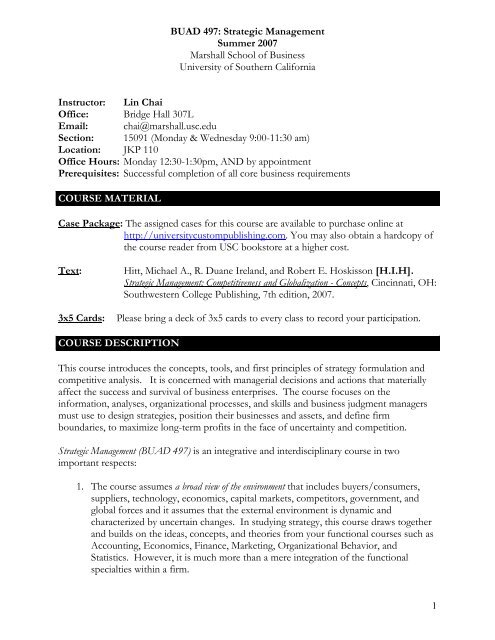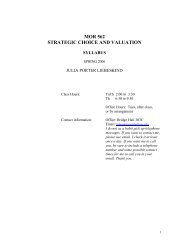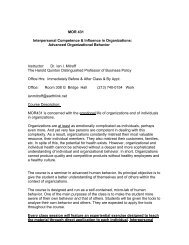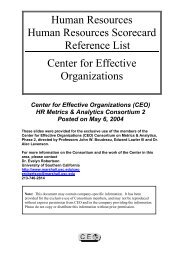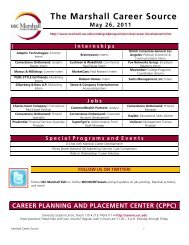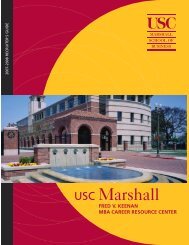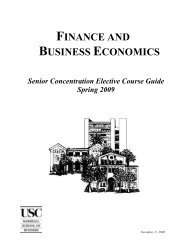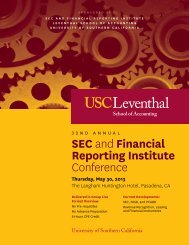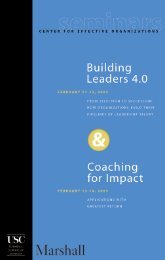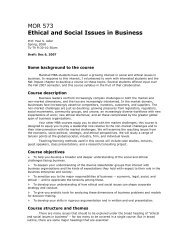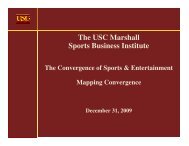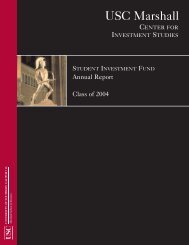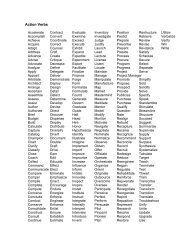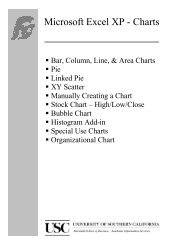BUAD 497: Strategic Management - USC Marshall - University of ...
BUAD 497: Strategic Management - USC Marshall - University of ...
BUAD 497: Strategic Management - USC Marshall - University of ...
Create successful ePaper yourself
Turn your PDF publications into a flip-book with our unique Google optimized e-Paper software.
<strong>BUAD</strong> <strong>497</strong>: <strong>Strategic</strong> <strong>Management</strong><br />
Summer 2007<br />
<strong>Marshall</strong> School <strong>of</strong> Business<br />
<strong>University</strong> <strong>of</strong> Southern California<br />
Instructor: Lin Chai<br />
Office: Bridge Hall 307L<br />
Email: chai@marshall.usc.edu<br />
Section: 15091 (Monday & Wednesday 9:00-11:30 am)<br />
Location: JKP 110<br />
Office Hours: Monday 12:30-1:30pm, AND by appointment<br />
Prerequisites: Successful completion <strong>of</strong> all core business requirements<br />
COURSE MATERIAL<br />
Case Package: The assigned cases for this course are available to purchase online at<br />
http://universitycustompublishing.com. You may also obtain a hardcopy <strong>of</strong><br />
the course reader from <strong>USC</strong> bookstore at a higher cost.<br />
Text: Hitt, Michael A., R. Duane Ireland, and Robert E. Hoskisson [H.I.H].<br />
<strong>Strategic</strong> <strong>Management</strong>: Competitiveness and Globalization - Concepts, Cincinnati, OH:<br />
Southwestern College Publishing, 7th edition, 2007.<br />
3x5 Cards: Please bring a deck <strong>of</strong> 3x5 cards to every class to record your participation.<br />
COURSE DESCRIPTION<br />
This course introduces the concepts, tools, and first principles <strong>of</strong> strategy formulation and<br />
competitive analysis. It is concerned with managerial decisions and actions that materially<br />
affect the success and survival <strong>of</strong> business enterprises. The course focuses on the<br />
information, analyses, organizational processes, and skills and business judgment managers<br />
must use to design strategies, position their businesses and assets, and define firm<br />
boundaries, to maximize long-term pr<strong>of</strong>its in the face <strong>of</strong> uncertainty and competition.<br />
<strong>Strategic</strong> <strong>Management</strong> (<strong>BUAD</strong> <strong>497</strong>) is an integrative and interdisciplinary course in two<br />
important respects:<br />
1. The course assumes a broad view <strong>of</strong> the environment that includes buyers/consumers,<br />
suppliers, technology, economics, capital markets, competitors, government, and<br />
global forces and it assumes that the external environment is dynamic and<br />
characterized by uncertain changes. In studying strategy, this course draws together<br />
and builds on the ideas, concepts, and theories from your functional courses such as<br />
Accounting, Economics, Finance, Marketing, Organizational Behavior, and<br />
Statistics. However, it is much more than a mere integration <strong>of</strong> the functional<br />
specialties within a firm.<br />
1
2. The course takes a general management perspective. It views the firm as a whole, and<br />
examines how policies in each functional area are integrated into an overall<br />
competitive strategy. This point <strong>of</strong> view is the best vantage point for making<br />
decisions that affect long run business performance. The key strategic business<br />
decisions <strong>of</strong> concern in this course involve determining and shaping organizational<br />
purpose to evolving opportunities, creating competitive advantages, choosing<br />
competitive strategies, securing and defending sustainable market positions, and<br />
allocating critical resources over long periods. Decisions such as these can only be<br />
made effectively by viewing a firm holistically, and over the long term.<br />
NOTE: <strong>BUAD</strong> <strong>497</strong> is a core course taught by several instructors. Policies regarding<br />
assignments and grading may be different for each instructor. Be sure to refer<br />
ONLY to this syllabus.<br />
COURSE FORMAT AND THE CASE DISCUSSION METHOD<br />
In order to achieve the objectives <strong>of</strong> the course, we will devote the majority <strong>of</strong> our class time<br />
to the analysis and discussion <strong>of</strong> selected management, competitive strategy, and business<br />
policy cases. Lectures will be given to elaborate on key theoretical models and frameworks<br />
or to reinforce crucial concepts.<br />
There are other reasons for employing the case discussion method <strong>of</strong> instruction. First, it<br />
allows you to develop skills at problem definition in addition to problem solving. Cases<br />
typically do not have an obvious set <strong>of</strong> tasks whose performance will lead to mastery.<br />
Rather, they force you to sift through a mass <strong>of</strong> information, some <strong>of</strong> it irrelevant or<br />
contradictory, in order to identify the important or strategic issues. Second, the case method<br />
gives you a chance to deal with ambiguity. Managers must be able to function in situations<br />
where the right answer is not known, without falling into the trap <strong>of</strong> assuming that any<br />
answer is as good as another. A popular phrase in case analysis classes is "There are no right<br />
answers, but there are wrong answers." Case discussion techniques provide a chance to learn<br />
the meaning <strong>of</strong> analytical rigor in situations other than open-and-shut problems. We will not<br />
attempt to exhaust each case <strong>of</strong> all its learning experiences, but rather build up a "war chest"<br />
<strong>of</strong> analytical tools, skills and insights, progressively over all the selected cases.<br />
There are two types <strong>of</strong> cases: written and video. Both forms provide you with information<br />
essential for subsequent discussion and debate but do so with different methods and<br />
constraints. Both the written and video cases require active in-class participation to ensure<br />
the class' success.<br />
The written case requires careful preparation before class. Written case preparation should<br />
include:<br />
1) Rapidly read the assigned case and other materials to gain a general understanding <strong>of</strong><br />
the industry, the firm, and the general competitive situation and issues.<br />
2) Carefully review the discussion questions provided in Blackboard for clues as to what<br />
issues require special attention.<br />
2
3) Carefully re-read the case, taking notes that sort information, facts, and observations<br />
under a number <strong>of</strong> relevant headings. Use the discussion questions to guide your<br />
own thinking about the issues.<br />
4) Formulate theories or hypotheses about what is going on as you read (e.g., "the<br />
company loses money on small orders"), modifying or rejecting them as new<br />
information surfaces (e.g., "Table 2 shows that shipping costs per unit are higher for<br />
small orders, but only for long-distance shipments").<br />
5) Perform quantitative analyses, “crunching” whatever numbers are available. It is also<br />
very important to provide quantitative support wherever possible, particularly when<br />
exploring various hypotheses as to the nature and importance <strong>of</strong> certain phenomena<br />
as well as identifying trends in the firm or industry. (If the requisite data are not<br />
available in the case, precise descriptions <strong>of</strong> what data are missing <strong>of</strong>ten triggers ideas<br />
for making creative use <strong>of</strong> the information that is available.)<br />
6) Prepare definitive conclusions before you come to class concerning the issues raised<br />
in the discussion questions.<br />
7) Try to anticipate the sequence <strong>of</strong> likely events and both their first and second level<br />
outcomes so that you can see what is likely to happen and how your<br />
recommendations may change them.<br />
8) Bring your detailed notes with you to class to help guide your interventions in class<br />
discussions.<br />
The video cases are shared across sections and are only available to me on-line and, therefore,<br />
are only shown at the beginning <strong>of</strong> class. Their purpose is to (1) provide a realistic setting in<br />
which to observe strategy in action and (2) provide visual impact leading to greater<br />
understanding. The video cases will require you to be able to put your understanding <strong>of</strong><br />
relationships and issues into use in near “real time,” a situation closer to that experienced by<br />
managers in high velocity environments. Your observational skills, short-term memory,<br />
insights, and judgment will be tested within a much faster time interval than in written cases<br />
where you will have time to read, contemplate, and discuss issues raised outside <strong>of</strong> class.<br />
However, because video cases are only shown at the start <strong>of</strong> the session and are not available<br />
outside <strong>of</strong> class, your prompt attendance is critical.<br />
COURSE EVALUATION<br />
Course grades will be determined by students’ relative performance on the following course<br />
components:<br />
Individual Participation 15%<br />
Individual Case Analysis (4) 20%<br />
Midterm Exam 20%<br />
Group Company Strategy Analysis Report 20%<br />
(Written and In-Class Presentation)<br />
Final Exam 25%<br />
100%<br />
In order to successfully pass this course, a passing grade (> 50%) must be achieved in each<br />
individual course component. Plus and minus grades will be assigned to those immediately<br />
3
above or below grade cut<strong>of</strong>f points. The distribution <strong>of</strong> grades will closely follow the<br />
guidelines <strong>of</strong> the <strong>Marshall</strong> School <strong>of</strong> Business (an average class GPA <strong>of</strong> 3.3).<br />
Individual Participation<br />
Your attendance in this course and active participation in case discussions are essential for<br />
advancing the learning <strong>of</strong> all participants. I expect you come to class on time and be fully<br />
prepared for class discussion. I will call on students at random, to take the lead in various<br />
aspects <strong>of</strong> class discussions at least once or twice during the semester. A classroom is a costfree<br />
environment for experimenting and learning. Make use <strong>of</strong> it.<br />
I score each <strong>of</strong> you at the end <strong>of</strong> each case discussion session by using a 2 if you are present;<br />
that 2 changes to a 1 if you are late or leave early. For efforts above sitting in class, I<br />
upgrade to a 3, 4, or 5 depending on the quality <strong>of</strong> your participation. With regard to quality,<br />
the dimensions include:<br />
Relevance<br />
Causal Linkage<br />
� Does the comment bear on the subject at hand?<br />
� Comments that do not link up with the discussion focus can<br />
detract from the learning experience.<br />
� Are the logical antecedents or consequences <strong>of</strong> a particular<br />
argument traced out?<br />
� Comments that push the implications <strong>of</strong> a fact or idea as far as<br />
possible are generally superior.<br />
Responsiveness<br />
� Does the comment react in an important way to what someone<br />
else has said?<br />
Analysis � Is reasoning consistent and logical?<br />
Evidence<br />
� Have data from the case, from personal experience or from<br />
Importance<br />
Clarity<br />
general knowledge been used for support?<br />
� Does the contribution further our understanding <strong>of</strong> the issues at<br />
hand?<br />
� Is a connection made with other cases we have analyzed?<br />
� Is the comment succinct and understandable?<br />
� Does the contribution stick to the subject or wander around?<br />
Based on these scores, your participation cards, and peer evaluations, I assign<br />
participation/commitment scores for the final point total based on the scoring sheet<br />
(developed several years ago by students at <strong>Marshall</strong>), which will be posted on Blackboard.<br />
Important: At the end <strong>of</strong> each case discussion, students who actively participated in the<br />
discussion should turn in a Participation Card. These cards should list your name, the date, the<br />
case discussed that day, and a synopsis <strong>of</strong> your contributions during that day’s discussion.<br />
The Participation Cards will be used in combination with my own daily evaluations to<br />
determine your participation grade for the day. For this purpose, please purchase a package<br />
<strong>of</strong> 3x5 index cards and bring them to each class.<br />
4
Individual Case Analysis<br />
You are required to turn in four (4) written case analysis assignments listed in the course<br />
schedule below, indicated by the sign <strong>of</strong> “HW.” They are:<br />
� Apple Computer case (May 23 rd)<br />
� Saturn: A Different Kind <strong>of</strong> Car Company case (June 6 th)<br />
� Vivendi case (June 28 th)<br />
� Nucleon case (July 9 th)<br />
Your individual case analysis assignments will typically consist <strong>of</strong> your key recommendations<br />
to the managers in a case, along with the supporting logic for those recommendations. You<br />
should identify the strategic problems facing the managers, state your position as what the<br />
managers in the case should do, and support that position using strategic logic and/or<br />
numerical and graphical analysis <strong>of</strong> data from the cases.<br />
Hints: You should not use precious space rehashing facts from the case. Instead, key facts<br />
should be used (judiciously) to help justify particular recommendations. That is, do not<br />
simply restate what the case writer has said. When making recommendations, you should<br />
not dwell on things that the company is already doing. Instead, you should develop your<br />
insights and strategic recommendations based on an in-depth analysis <strong>of</strong> the facts provided<br />
by the case. In doing so, you will learn to go beyond the facts or manifestations <strong>of</strong> a<br />
phenomenon to uncover deeper elements for moving a business forward.<br />
All assignments should be presented in memo format (bullet points are acceptable if the points<br />
are explained sufficiently) and must be no longer than two pages. They must be typed in 12-point font,<br />
1-½ spaced, and with one-inch margins around the page. Supporting illustrative figures, charts and<br />
spreadsheet calculations are excluded from the two-page limit and should be attached as<br />
appendixes.<br />
Note: All assignments must be handed in person at the beginning <strong>of</strong> class sessions. Late<br />
assignments will not be accepted.<br />
Group Company Strategy Analysis Report<br />
You will write a (maximum) 30-page strategic analysis <strong>of</strong> an organization as part <strong>of</strong> a group.<br />
The evaluation criteria, format, and proposed list <strong>of</strong> organizations will be posted on<br />
Blackboard. On May 30 th, your group should submit the name <strong>of</strong> your company and your<br />
group members (1 page). Sign-ups for the companies will be on a first-come, first-served<br />
basis. Groups that do not choose a firm for analysis will be assigned one.<br />
The group strategy report will include a detailed analysis <strong>of</strong> the industry within which the<br />
company competes, the organization’s source <strong>of</strong> competitive advantage, the sustainability <strong>of</strong><br />
that competitive advantage, and culminate with a strategic plan for the organization’s future.<br />
The 30-page analysis is due on July 23 rd. Please meet with me as early as possible to discuss your<br />
group paper.<br />
All teams shall submit a copy <strong>of</strong> their PowerPoint slides to the instructor at the beginning <strong>of</strong><br />
the first scheduled day <strong>of</strong> case presentations. A random selection will determine the order <strong>of</strong><br />
presentation. Presentations should take about 35 minutes: 25 minutes for the presentation<br />
5
and 10 minutes to answer audience questions. Presentations will be evaluated on your<br />
audiovisual materials turned in at the start <strong>of</strong> the session and your ability in explaining and<br />
defending your conclusions.<br />
Note: Group Company Strategy Analysis Report (Written and In-Class Presentation) will be graded<br />
on a group basis unless a formal compliant is filed jointly by the group. Each <strong>of</strong> you will<br />
complete a peer evaluation <strong>of</strong> your group members. Peer evaluation forms are due on July<br />
25 th, and your care in completing the forms contributes to your participation/commitment<br />
grade.<br />
Midterm Exam<br />
The midterm exam will be given on June 20 th, 9:00-11:00am. The exam may consist <strong>of</strong> a<br />
combination <strong>of</strong> multiple-choice, true/false and short-answer questions. No make-up exam<br />
will be allowed.<br />
Final Exam<br />
The final exam will ONLY be given on July 30 th, 9:00-11:00am. The format <strong>of</strong> the final exam<br />
is similar to midterm. The final exam is not cumulative.<br />
COURSE POLICIES<br />
Attendance<br />
Class attendance is critically important! All missed classes result in a loss <strong>of</strong> class<br />
contribution and participation points for that day. Habitual lateness (and leaving class early),<br />
for whatever reason, will be noted as evidence <strong>of</strong> low course commitment.<br />
Turn <strong>of</strong>f all Communication and Entertainment Devices<br />
Please note that all communication devices such as computers, cell phones, Blackberries, etc.<br />
capable <strong>of</strong> sending and or receiving electronic communication and all entertainment devices<br />
such as iPods or other MP3 players are to be turned <strong>of</strong>f and kept <strong>of</strong>f throughout the class<br />
session. Receiving or sending communication or entertainment during class disrupts the<br />
learning environment and is rude to those around you.<br />
Returned Assignments<br />
The <strong>Marshall</strong> School <strong>of</strong> Business policy for returning papers is as follows: Returned<br />
paperwork, unclaimed by a student, will be discarded after four weeks and hence, will not be<br />
available should a grade appeal be pursued by a student following receipt <strong>of</strong> his/her course<br />
grade.<br />
COURSE COMMUNICATION: BLACKBOARD SYSTEM<br />
The course syllabus and assignment information will be posted to the <strong>497</strong> folder for your<br />
section in Blackboard. I will also post additional course lecture notes/materials, further<br />
details on assignments, and general course announcements to this folder throughout the<br />
semester. You should develop the habit <strong>of</strong> checking the course folder on a daily basis. You<br />
can access Blackboard either by going to http://totale.usc.edu/webapps/portal/frameset.jsp<br />
or by going through the “My <strong>Marshall</strong>” portal http://mymarshall.usc.edu. You will need<br />
your UNIX password for either site.<br />
6
IMPORTANT:<br />
(1) Since e-mails sent to the class originate from the Blackboard system, it is your<br />
responsibility to verify your e-mail address to Blackboard by insuring that your Blackboard<br />
account settings forward your messages to your preferred internet provider (IP) account<br />
such as EarthLink, AOL, Hotlink, etc.<br />
(2) Be certain that you include a recent digital color photograph <strong>of</strong> yourself within the<br />
personal information section, as I will use these to learn your names (important for your<br />
participation grade and future letters <strong>of</strong> recommendation).<br />
ACADEMIC INTEGRITY<br />
The following information on academic integrity, dishonesty, and the grading standard are<br />
placed here at the recommendation <strong>of</strong> the School <strong>of</strong> Business Administration Faculty and<br />
are taken from the Faculty Handbook. Additional statements about academic integrity may<br />
be found in SCampus handbook available at the Topping Student Center and online at<br />
http://www.usc.edu/go/scampus. Further information may be obtained from the Office <strong>of</strong><br />
Student Judicial Affairs and Community Standards at http://www.usc.edu/studentaffairs/SJACS/index.<br />
“The <strong>University</strong>, as an instrument <strong>of</strong> learning, is predicated on the existence <strong>of</strong> an<br />
environment <strong>of</strong> integrity. As members <strong>of</strong> the academic community, faculty, students, and<br />
administrative <strong>of</strong>ficials share the responsibility for maintaining this environment. Faculty<br />
has the primary responsibility for establishing and maintaining an atmosphere and attitude <strong>of</strong><br />
academic integrity such that the enterprise may flourish in an open and honest way.<br />
Students share this responsibility for maintaining standards <strong>of</strong> academic performance and<br />
classroom behavior conducive to the learning process. Administrative <strong>of</strong>ficials are<br />
responsible for the establishment and maintenance <strong>of</strong> procedures to support and enforce<br />
those academic standards. Thus, the entire <strong>University</strong> community bears the responsibility<br />
for maintaining an environment <strong>of</strong> integrity and for taking appropriate action to sanction<br />
individuals involved in any violation. When there is a clear indication that such individuals<br />
are unwilling or unable to support these standards, they should not be allowed to remain in<br />
the <strong>University</strong>.” (Faculty Handbook, 1994: 20)<br />
Academic dishonesty includes: (Faculty Handbook, 1994: 21-22)<br />
1. Examination behavior - any use <strong>of</strong> external assistance during an examination shall be<br />
considered academically dishonest unless expressly permitted by the teacher.<br />
2. Fabrication - any intentional falsification or invention <strong>of</strong> data or citation in an academic<br />
exercise will be considered a violation <strong>of</strong> academic integrity.<br />
3. Plagiarism - the appropriation and subsequent passing <strong>of</strong>f another’s ideas or words as<br />
one’s own. If the words or ideas <strong>of</strong> another are used, acknowledgment <strong>of</strong> the original<br />
source must be made through recognized referencing practices.<br />
4. Other Types <strong>of</strong> Academic Dishonesty - submitting a paper written by or obtained from<br />
another, using a paper or essay in more than one class without the teacher’s express<br />
permission, obtaining a copy <strong>of</strong> an examination in advance without the knowledge and<br />
consent <strong>of</strong> the teacher, changing academic records outside <strong>of</strong> normal procedures and/or<br />
7
petitions, using another person to complete homework assignments or take-home exams<br />
without the knowledge or consent <strong>of</strong> the teacher.<br />
The use <strong>of</strong> unauthorized material, communication with fellow students during an<br />
examination, attempting to benefit from the work <strong>of</strong> another student, and similar behavior<br />
that defeats the intent <strong>of</strong> an examination or other class work is unacceptable to the<br />
<strong>University</strong>. It is <strong>of</strong>ten difficult to distinguish between a culpable act and inadvertent<br />
behavior resulting from the nervous tensions accompanying examinations. Where a clear<br />
violation has occurred, however, the instructor may disqualify the student’s work as<br />
unacceptable and assign a failing mark on the paper.<br />
STUDENTS WITH DISABILITIES<br />
Any student requesting academic accommodations based on a disability is required to<br />
register with Disability Services and Programs (DSP) each semester. A letter <strong>of</strong> verification<br />
for approved accommodations can be obtained from DSP. Please be sure the letter is<br />
delivered to me as early in the semester as possible. DSP is located in STU 301 and is open<br />
8:30 a.m. – 5:00 p.m., Monday through Friday. The phone number for DSP is (213) 740-<br />
0776.<br />
IMPORTANT DATES<br />
First day <strong>of</strong> class: Wednesday, May 16, 2007<br />
Last day to add: Monday, June 4, 2007<br />
Last day to drop without a mark <strong>of</strong> "W" and receive a full refund: Monday, June 4, 2007<br />
Last day to drop with a mark <strong>of</strong> "W": Tuesday, July 17, 2007<br />
End <strong>of</strong> session: Tuesday, July 31, 2007<br />
8
<strong>BUAD</strong><strong>497</strong> COURSE SCHEDULE 1<br />
Session Date<br />
1 5-16 W<br />
INDUSTRY ANALYSIS<br />
2 5-21 M<br />
3 5-23 W<br />
Memorial Day<br />
4 5-28 M<br />
No Class<br />
Content<br />
Course Introduction and Overview<br />
Lecture/Discussion: <strong>Strategic</strong> Thinking (HIH: 1, 12. CP:<br />
What Is Strategy?)<br />
Case: Wal*Mart Stores, Inc.<br />
Lecture/Discussion: External Analysis & the Business<br />
Landscape (HIH: 2)<br />
Case: Apple Computer – HW<br />
Case: Coca Cola vs. Pepsi-Cola and the S<strong>of</strong>t Drink Industry<br />
CREATING AND SUSTAINING A COMPETITIVE POSITION<br />
5 5-30 W<br />
6 6-4 M<br />
7 6-6 W<br />
8 6-11 M TBD<br />
Lecture/Discussion: The Internal Environment (HIH: 3, 4)<br />
Group Company Strategy Analysis Selection Due<br />
Case: The Ready to Eat Breakfast Cereal Industry<br />
Video Case: Cappuccino Trail: The Global Economy in a Cup<br />
Case: Saturn: A Different Kind <strong>of</strong> Car Company – HW<br />
Video Case: General Motors: Driving the World from Detroit?<br />
CORPORATE STRATEGY<br />
9 6-13 W<br />
10 6-18 M<br />
Lecture/Discussion: Anticipating Competition and<br />
Cooperative Dynamics (HIH: 5, 9)<br />
Case: Barnes and Noble versus Amazon.com<br />
Case: Intel Corp. 1968-1997<br />
11 6-20 W Midterm (9:00-11:00 AM)<br />
1 Slight adjustments may apply to the <strong>BUAD</strong><strong>497</strong> course schedule as the semester progresses.<br />
9
12 6-25<br />
Lecture/Discussion: Rivalry Issues (HIH: 6,7. CP: The<br />
M Right Game)<br />
Case: Nintendo<br />
Case: Vivendi – HW<br />
13 6-28 W<br />
Case: Choice Hotels<br />
GETTING INSIDE THE FIRM: MANAGING SUBSIDIARIES AND PEOPLE<br />
14 7-2 M<br />
Happy July 4th!<br />
15 7-4 W<br />
No Class<br />
16 7-9 M<br />
Lecture/Discussion on multi-site firms (HIH: 8, 10)<br />
Video Case: The eBay Effect<br />
Case: Nucleon – HW<br />
Case: Euro Disney<br />
17 7-11 W Lecture/Discussion: Leadership, Decisions (HIH: 11,13)<br />
18 7-16 M<br />
19 7-18 W TBD<br />
20 7-23 M<br />
Case: Lincoln Electric<br />
Case: The Body Shop<br />
Group Company Strategy Analysis Presentation Day 1<br />
Company Analysis Group Project Written Report Due<br />
Group Company Strategy Analysis Presentation Day 2<br />
21 7-25 W<br />
Peer Evaluation Due<br />
22 7-30 M Final Exam (9:00-11:00 AM)<br />
CP denotes Course Reader / Case Package<br />
HW denotes a homework case to be turned in at the beginning <strong>of</strong> this class period.<br />
HIH denotes reading in the Hitt, Ireland & Hoskisson, <strong>Strategic</strong> <strong>Management</strong> textbook<br />
10


